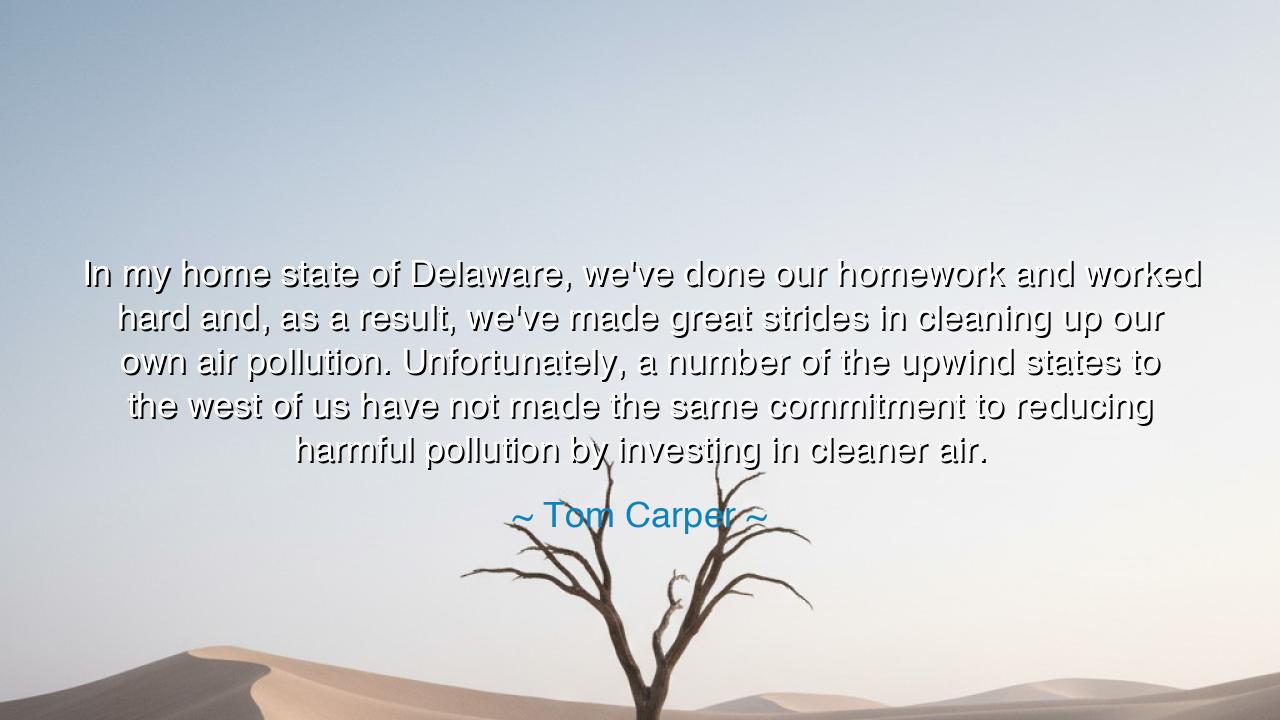
In my home state of Delaware, we've done our homework and worked
In my home state of Delaware, we've done our homework and worked hard and, as a result, we've made great strides in cleaning up our own air pollution. Unfortunately, a number of the upwind states to the west of us have not made the same commitment to reducing harmful pollution by investing in cleaner air.






When Tom Carper said, “In my home state of Delaware, we’ve done our homework and worked hard and, as a result, we’ve made great strides in cleaning up our own air pollution. Unfortunately, a number of the upwind states to the west of us have not made the same commitment to reducing harmful pollution by investing in cleaner air,” he was not merely speaking of geography or policy — he was speaking of responsibility, of interconnectedness, and of the ancient truth that the actions of one affect the well-being of all. Beneath his words lies a moral wisdom as old as civilization itself: that one community cannot truly flourish while its neighbors neglect the health of the earth they share. His message is both a celebration of diligence and a lament for imbalance — a reminder that progress in isolation is not progress at all if the air that sustains us remains shared and unguarded.
The origin of this reflection lies in Carper’s lifelong advocacy for environmental stewardship. As a senator from Delaware, a small state bordered by industry-heavy regions, Carper has witnessed firsthand the paradox of responsibility: how one state’s labor to heal the land can be undone by another’s indifference. The winds that carry life also carry consequence; the air that one breathes freely may be burdened by another’s neglect. Thus, his words are not a political accusation, but a moral call — a plea for unity in purpose. In them, we hear the echo of an ancient understanding: that humanity’s fate, like the air itself, knows no borders.
To the ancients, the air was sacred — the breath of life, the unseen spirit that connects all living things. In Greek philosophy, pneuma meant both “breath” and “soul,” and the Stoics believed it was the divine current binding all beings together. To foul the air, then, was not merely to pollute the earth, but to disrupt the harmony between man and the cosmos. Carper’s warning is thus more profound than environmental policy — it is a modern invocation of this timeless truth. The air belongs to no one, and therefore, it belongs to all. To neglect it is to deny the shared soul of humanity.
History offers countless mirrors to this lesson. In the days of ancient Rome, the Tiber River once ran pure, providing water and trade to the city that ruled the world. But as Rome grew in power, its waste grew with it, and the river became a symbol of corruption — both literal and moral. The empire that once prided itself on engineering marvels could not master its own pollution, and the decay of its waters foretold the decay of its soul. In the same way, Carper warns us: technological advancement without moral stewardship leads to collapse. To clean one’s own home while ignoring the filth next door is to invite ruin into both.
Carper’s praise of Delaware’s diligence — that his people have “done their homework and worked hard” — is also a call to discipline and foresight. He speaks as one who understands that progress is neither accidental nor effortless. The ancients taught that virtue is the product of consistent labor — the farmer who tends his soil, the scholar who sharpens his mind, the leader who governs with justice. But virtue, when practiced in solitude, is incomplete. The clean air of one state cannot remain pure while the neighboring winds carry poison. True virtue must be shared; it must expand outward like the ripples of a stone cast upon still water.
The emotional heart of Carper’s message lies in the sorrow of interdependence ignored. He reminds us that the bonds of creation do not end at the line drawn on a map. The pollution that drifts from one land to another is but a metaphor for all the ways humanity’s carelessness crosses boundaries — greed, indifference, and apathy carried on invisible winds. Yet, within his lament lies hope: for if harm can travel far, so too can healing. The same air that carries smoke can also carry song; the same wind that bears poison can, if we will it, bear renewal.
The lesson of Carper’s words, then, is clear and eternal: responsibility is not confined to borders. Whether in the stewardship of the planet, the conduct of nations, or the daily acts of individuals, we are each custodians of a shared world. One cannot claim purity while benefitting from another’s neglect; one cannot breathe clean while turning a blind eye to the suffering carried on the wind. The ancients taught that harmony is the highest virtue — the alignment of individual good with the good of all. To live by this principle today means to act not only for one’s own community, but for the unseen others whose fate is bound with ours.
Thus, Tom Carper’s reflection stands as both warning and wisdom. It tells us that progress unshared is illusion, that diligence without solidarity is fragility. The air unites us — it is the great equalizer, the silent thread that binds Delaware to the world, one breath to another. Let us, then, become guardians of that breath. Let our labor be both local and universal, our progress both personal and communal. For only when every state, every nation, and every soul labors together for clean air and clean conscience, will we truly be able to say that we have honored the earth — and each other.






AAdministratorAdministrator
Welcome, honored guests. Please leave a comment, we will respond soon